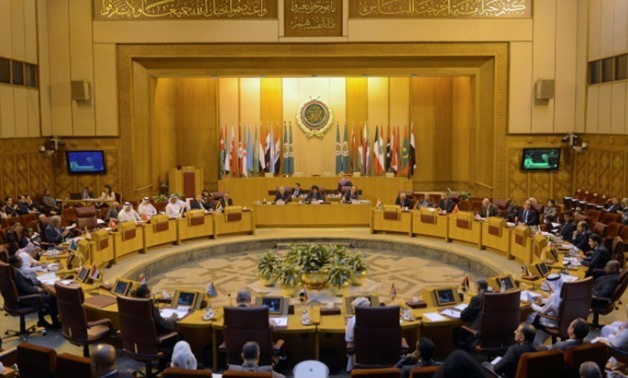
A general view of the Arab League delegates meeting- Egypt December 5 -2017 - REUTERS
CAIRO – 25 June 2020: The emergency meeting of the Arab League on Libya, requested by Egypt, took place on June 23. In the meeting, Secretary-General Ahmed Aboul Gheit condemned all kinds of foreign interference in Libya and warned of the continuation of the ongoing conflict.
The Arab League stressed the importance of finding a political solution to the Libyan crisis, committing to the territorial integrity and sovereignty of its lands, and rejecting all illegal foreign interventions.
The Arab League resolution, which included 14 items, called for the withdrawal of all foreign forces present on Libyan territory and within its territorial waters. The decision stressed the central and essential role played by the countries neighboring Libya and the importance of coordination among them in efforts to end the crisis.
The Arab League's decision stated that Qatar, Tunisia, and Somalia have reservations about some of the provisions of the resolution, and Libya (represented by the Al-Wefaq government) also has reservations about some of the provisions of the resolution, accusing the Arab League of having double standards.
While Tunisia has reservations about the eighth item of the resolution and the last line of the seventh item, Somalia has reservations about the seventh, eighth and eleventh items.
Moreover, Qatar requested that items 8 and 11 of the draft resolution disputed between Egypt and Libya be deleted and referred to the secretary-general for being studied in accordance with the decision published by the League of Arab States.
In the coming lines, the texts of the seventh, eighth, and eleventh items that some countries have reservations about are showcased
The Seventh Item
The item stressed the rejection of all illegal foreign interventions that violate international laws, decisions, and norms, and contribute to the spread of terrorist armed militias seeking to spread ideas of extremism, violence, and terrorism, and demanding the withdrawal of all foreign forces present on Libyan territory and within Libyan territorial waters, and warning against continuing military action to avoid the ongoing conflict.
The Eighth Item
The item emphasized welcoming all international initiatives, efforts, and efforts of neighboring countries aimed at stopping military operations and resuming the political process in Libya under the auspices of the United Nations, as well as welcoming the Cairo Declaration on Libya issued on 6/6/2020.
The Cairo Declaration is based on the fact that the solution in Libya must be based on the Libyan political agreement, relevant Security Council resolutions, the outputs of the Berlin Conference, summits and previous international efforts for a comprehensive political solution, respect for human rights and international humanitarian law, and the request of all Libyan and international parties to engage positively with these initiatives.
The Eleventh item
The item stressed the importance of the United Nations and the international community obliging all external parties to remove mercenaries from all Libyan areas, and to work to unify the military and security institutions in Libya within the path of a political solution, dismantling the militias and handing over their weapons per the conclusions of the Berlin Conference.
For its part, Al-Wefaq government, which is not recognized internationally, said that it was surprised by the double standards adopted by the Arab League in dealing with the situation in Libya, as no decision was issued calling the aggressor forces and their supporters to any emergency meeting."Tripoli wasunder bombing by air and artillery fire, to stop the aggression and military operations but Al-Wefaq forces managed to defeat the aggression and headed towards recovering the kidnapped cities."
The unrecognized Libyan government has reservations about the seventh item, from calling for the withdrawal of troops to the end of the paragraph.
It also has reservations on the eighth item, stressing that whoever wants to play the mediation role must be unbiased to one party, given that the reconciliation government is not invited or consulted in this initiative.
Al-Wefaq Government further added that it is not based on the terms of reference for a political settlement in Libya, whether the Libyan political agreement signed in Skhirat, Morocco, the Berlin Initiative or Security Council Resolution 2510.
On June 6, 2020, Egyptian President Abdel Fatah al-Sisi announced Cairo's plan for a ceasefire in Libya, beginning June 8, after a tripartite meeting with Commander of the Libyan National Army (LNA) Khalifa Haftar and Speaker of Libyan Parliament Aguila Saleh.
Sisi said that the political initiative, which he called the Cairo Declaration would pave the way for a return to normal life in Libya. President Sisi warned against using military tactics to resolve the crisis.
Over the years of war, Libya has become divided between west and east; the GNA, based in Tripoli; and the Libyan National Army (LNA), based in the eastern city of Benghazi.
Turkey has escalated its support in recent months for the Tripoli-based government, supplying armed drones, military experts, and thousands of Syrian fighters to shore up its presence in the eastern Mediterranean. Its efforts have rattled its regional rivals, especially Egypt, which shares a long and porous desert border with Libya.

Comments
Leave a Comment